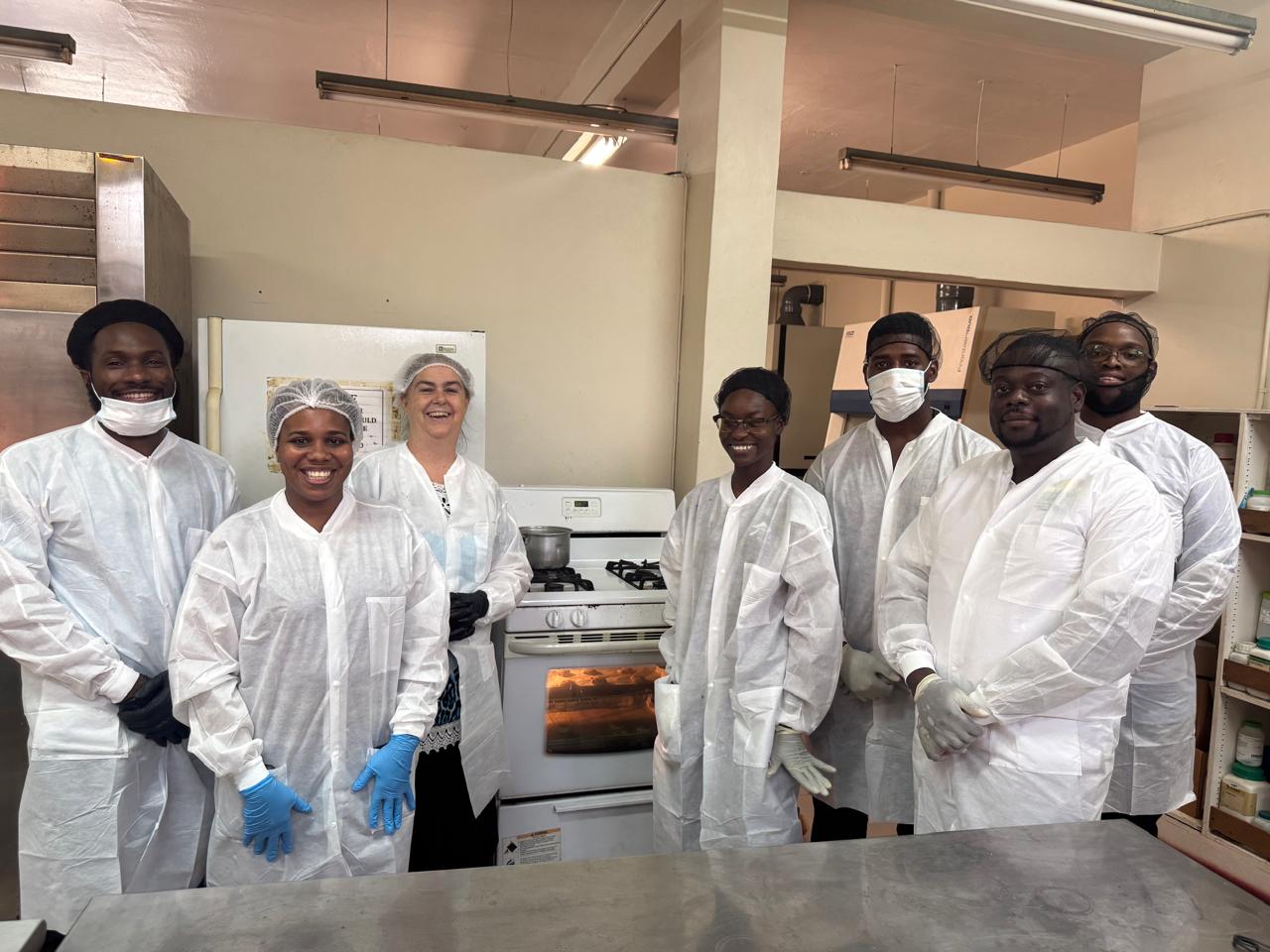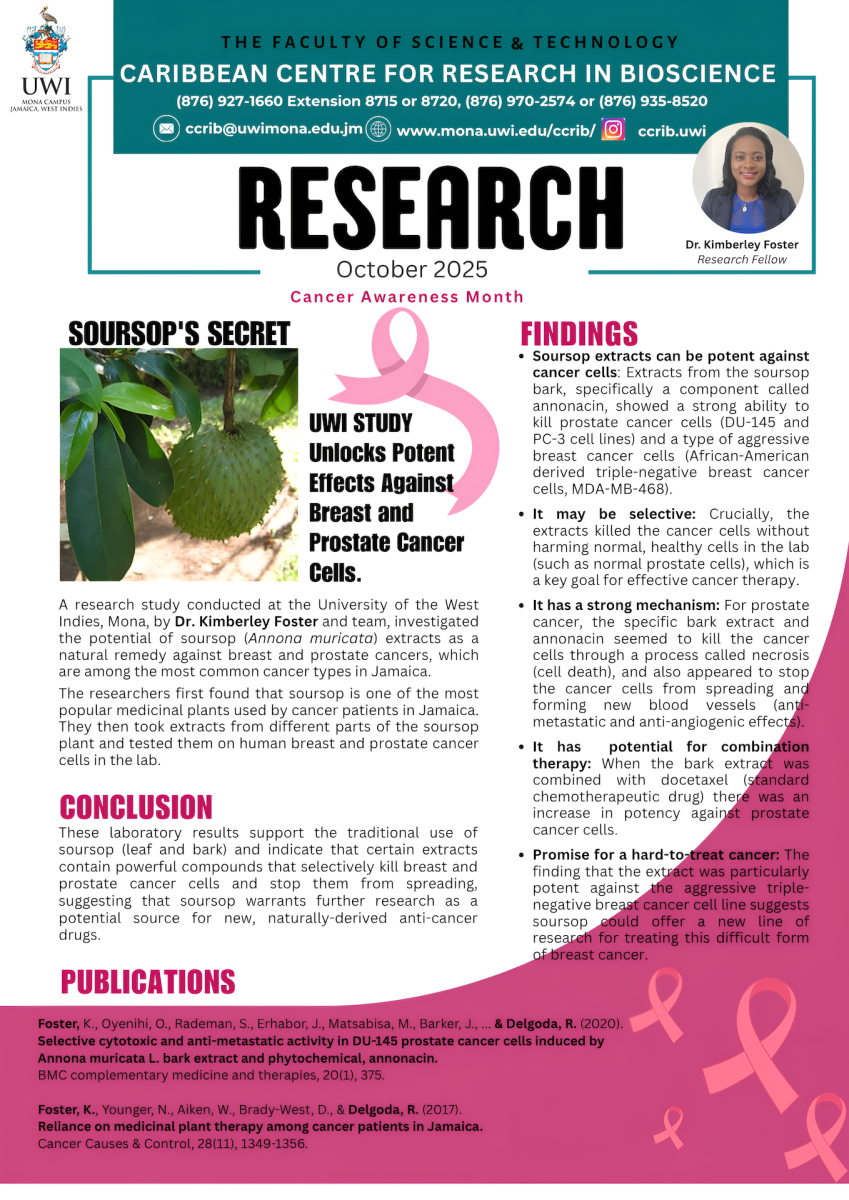

On January 28, 2026, Miss. Timmera Grant, PhD Candidate, was honoured by the Women In Science Emergency (WISE) Initiative, a partnership between the United Nations Educational, Scientific and Cultural Organization (UNESCO) for the Caribbean and the University of the West Indies (UWI), Faculty of Science and Technology. Miss. Grant was recognized for her dedicated efforts and resilience following the devastation of Hurricane Mellisa in 2025.
We congratulate her on this prestigious recognition of her scientific contributions.

On January 28, 2026, Miss. Angelleath James, MPhil Candidate, was honoured by the Women In Science Emergency (WISE) Initiative, a partnership between the United Nations Educational, Scientific and Cultural Organization (UNESCO) for the Caribbean and the University of the West Indies (UWI), Faculty of Science and Technology. Miss. James was recognized for her dedicated efforts and resilience following the devastation of Hurricane Mellisa in 2025.
We congratulate her on this prestigious recognition of her scientific contributions.

On January 28, 2026, Miss. Denielle Boothe, PhD Candidate, was honoured by the Women In Science Emergency (WISE) Initiative, a partnership between the United Nations Educational, Scientific and Cultural Organization (UNESCO) for the Caribbean and the University of the West Indies (UWI), Faculty of Science and Technology. Miss. Boothe was recognized for her dedicated efforts and resilience following the devastation of Hurricane Mellisa in 2025.
We congratulate her on this prestigious recognition of her scientific contributions.

On January 28, 2026, Mrs. Juliet Smith-Marshall, PhD Candidate, was honoured by the Women In Science Emergency (WISE) Initiative, a partnership between the United Nations Educational, Scientific and Cultural Organization (UNESCO) for the Caribbean and the University of the West Indies (UWI), Faculty of Science and Technology. Mrs. Smith-Marshall was recognized for her dedicated efforts and resilience following the devastation of Hurricane Mellisa in 2025.
We congratulate her on this prestigious recognition of her scientific contributions.

On January 28, 2026, Dr. Sylvia Mitchell was honoured by the Women In Science Emergency (WISE) Initiative, a partnership between the United Nations Educational, Scientific and Cultural Organization (UNESCO) for the Caribbean and the University of the West Indies (UWI), Faculty of Science and Technology. Dr. Mitchell was recognized for her dedicated efforts and resilience following the devastation of Hurricane Mellisa in 2025.
We congratulate her on this prestigious recognition of her scientific contributions.

On January 28, 2026, Dr. Sheena Francis was honoured by the Women In Science Emergency (WISE) Initiative, a partnership between the United Nations Educational, Scientific and Cultural Organization (UNESCO) for the Caribbean and the University of the West Indies (UWI), Faculty of Science and Technology. Dr. Francis, along with her students Mrs. Juliet Smith-Marshall and Miss Denielle Boothe, were recognized for their dedicated efforts and resilience following the devastation of Hurricane Mellisa in 2025.
We congratulate them on this prestigious recognition of their scientific contributions.

Photo caption 1: Participants in the Food Product Development Course displaying their products.
The Caribbean Centre for Research in Bioscience (UWI-CCRIB) and the Mona Academy of Science and Technology successfully delivered the Food Product Development Course, which ran from July 17, 2024 to October 17, 2025, under the IV Mexico–Jamaica Technical and Scientific Cooperation Programme. The course was offered in partnership with the Universidad Panamericana, with instruction provided by Dr. Dra. Julieta Domínguez-Soberanes (leader), Dr. Aarón González, Dra. Irery Lizbeth Melchor Durán and Mtro. Abraham Baltazar.
Twenty participants from academia and the private and public sectors benefited from the programme’s comprehensive hybrid format. The course integrated online theoretical instruction from the Mexican facilitators with practical, hands-on laboratory sessions conducted at the UWI Food Lab and coordinated by UWI-CCRIB Project Coordinator, Mr. Jordon L. Freeman (PhD candidate in Biotechnology).
The practical workshop, held from October 12–17, 2025, guided participants through key stages of product development, including concept refinement, prototype formulation, sensory evaluation, and business model planning. The week concluded with final presentations and the submission of complete project portfolios.
This collaborative initiative significantly strengthened regional capacity in applied product innovation and marked the successful completion of Phase II, paving the way for the issuance of ‘Diploma in Food Product Development’ from the Universidad Panamericana to all participants.

Photo caption 2: Participants in the UWI Food Lab as they complete the Food Product Development Course.
Published by The Faculty of Science & Technology (FST), UWI

The University of the West Indies is pleased to announce that Dr. Sylvia Adjoa Mitchell, Senior Lecturer in the Medicinal Plant Biotechnology Research Group (MPBRG) at the Caribbean Centre for Research in Bioscience, Biotechnology Centre (CCRIB-BTC), represented The UWI at the Food and Agriculture Organization (FAO) of the United Nations Global Technical Recognition Ceremony for her work in Sustainable Plant Production and Protection. The University of the West Indies has been selected as a recipient of Technical Recognition of the Food and Agriculture Organization in the area of Sustainable plant production and protection. This ceremony was held October 15, 2025.
Congratulations to Dr. Mitchell and her team!!!

Today, The Caribbean Centre for Research in Bioscience (CCRiB), a research centre of the Faculty of Science and Technology at the University of the West Indies, highlights research work done by Dr. Kimberley Foster (Research Fellow) and team. The research demonstrated the potency of Annona muricata, the Soursop plant (natural products) in killing breast and prostate cancer cells and stopping them from spreading to surrounding tissues.
The details of this research can be examined in the publications below:
Publication 1:
Foster, K., Oyenihi, O., Rademan, S., Erhabor, J., Matsabisa, M., Barker, J., ...& Delgoda, R. (2020).
Selective cytotoxic and anti-metastatic activity in DU-145 prostate cancer cells induced by Annona muricata L. bark extract and phytochemical, annonacin.
BMC complementary medicine and therapies, 20(1), 375.
https://bmccomplementmedtherapies.biomedcentral.com/articles/10.1186/s12906-020-03130-z
Publication 2:
Foster, K., Younger, N., Aiken, W., Brady-West, D., & Delgoda, R. (2017).
Reliance on medicinal plant therapy among cancer patients in Jamaica.
Cancer Causes & Control, 28(11), 1349-1356.

Photo caption (left to right): (1) Professor John Lindo Director of MORI (represented the Principal), (2) His Excellency Mr. Mayank Joshi, High Commissioner of India to Jamaica, (3) Professor Rupika Delgoda, Director of CCRiB, (4) Mrs Isha Joshi, High Commissioner's wife, (5) Ms Emma Subratie, MD HemaLuxe, (6) Ms Shalane Lee, Wellness Entrepreneur, (7) Dr. Michelle Hamilton, Naturopathic Physician, (8) Dr. David Picking, Senior Research Fellow - CCRiB.
The Faculty of Science and Technology (FST) proudly partnered with the High Commission of India to celebrate 'Ayurveda Day' on Friday, September 26, 2025, made possible through the work of Dr. David Picking (Senior Research Fellow) and Prof. Rupika Delgoda (Director) at the Caribbean Centre for Research in Bioscience (CCRIB). This collaboration highlights the significance of traditional Indian medicine and its growing global relevance and CCRIB's mission to advance bioscience research in Jamaica.
His Excellency, Mr. Mayank Joshi, High Commissioner of India to Jamaica, delivered a compelling address, emphasizing the ongoing partnership between India and Jamaica. He noted that Ayurveda's principles of balance, sustainability, and natural healing resonate globally, offering valuable insights for modern healthcare.
The event was well attended and helped further strengthen ongoing collaborative efforts with the High Commission of India to Jamaica.